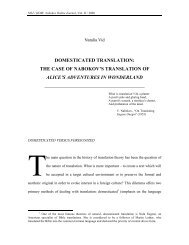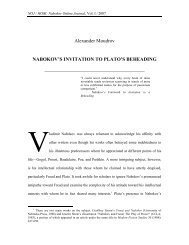You also want an ePaper? Increase the reach of your titles
YUMPU automatically turns print PDFs into web optimized ePapers that Google loves.
Nabokov Online Journal, Vol. V (2011)<br />
_______________________________________________________________________<br />
viewing these as he does as a form of psychological compulsion has kept him from<br />
discerning a more complicated, unique, and lasting emotion. 13 When Humbert meets the<br />
grown-up, pregnant Lolita “with her adult, rope-veined narrow hands and her goose-flesh<br />
white arms, and her shallow ears, and her unkempt armpits,” he surprises himself with an<br />
overpowering feeling of tenderness for this emphatically non-nymphetic Lolita. 14 In the<br />
passage that follows, Humbert attempts to persuade his readers (“you may jeer at me, and<br />
threaten to clear the court, but until I am gagged and half-throttled, I will shout my poor<br />
truth” [278]) that his attachment to Lolita was more than just pedophilic lust. But most<br />
eloquent here is the emotive and unnecessary “thank God” which betrays Humbert’s<br />
earlier misreadings of his own self, his relief upon realizing that he is capable of more<br />
than he had given himself credit for: “She was only the faint violet whiff and dead leaf<br />
echo of a nymphet … but thank God it was not that echo alone that I worshipped” (278).<br />
His own newly discernible three-dimensionality leads him to deconstruct his previously<br />
composed portrait of Lolita; doing so, he treads lightly, seeking to avoid the<br />
shortcomings of his earlier, failed creative work. He searches for gaps in his conception<br />
of Lolita without trying to fill them with new fictions of memory. These gaps penetrate<br />
13 Critics have noted that while in Humbert’s rendition of events, this passage follows his encounter with<br />
the changed Lolita and his realization about his undying love for her, the actual occurrence of standing on<br />
the hill and listening to the music of children at play is supposed to have taken place much earlier, soon<br />
after Lolita’s escape. Humbert tells us that he had “evoked” this moment of hilltop epiphany just before<br />
being taken away by the police, presumably for his murder of Quilty: “And while I was waiting for them to<br />
run up to me on the high slope, I evoked a last mirage of wonder and hopelessness” (307). Mirage, derived<br />
from the French se mirer (to be reflected), is of course especially associated with the thirst-induced optical<br />
illusion of water in a desert; as such it has strong connotations of wishful thinking. It is the reflection of<br />
his/her own desire that the wanderer sees. And so for the purpose of gauging Humbert’s transformation, the<br />
question of whether two years previously Humbert had, in fact, experienced this remorseful epiphany is<br />
entirely immaterial; what matters is that by the end of the novel, when he tells us about it, he experiences it<br />
as a mirage, i.e., he wishes that he had experienced it. The mirage, the wish fulfilled, represents the<br />
adoption of a moral point of view – an instance of ethical thinking on Humbert’s part.<br />
14 Leland de la Durantaye proposes that the astute reader should find Humbert’s moral apotheosis in this<br />
encounter with the pregnant Lolita rather than where it has usually been detected, in the above-mentioned<br />
episode on the hill (Style is Matter 89). While I agree that this remarkable scene is epiphanic, its selfreferentiality<br />
would seem to mitigate its moral force. Nabokov may very well have subscribed to the<br />
ideology of love, having himself asserted that “Humbert Humbert in his last stage is a moral man because<br />
he realizes that he loves Lolita like any woman should be loved” (quoted in Style is Matter 90). But it is a<br />
separate question whether Humbert’s love here is agape or eros, and whether any instance of the latter can<br />
be said to be either moral or immoral. Either way, if, as de la Durantaye argues elsewhere, Humbert’s<br />
moral advance comes with the acquisition of empathy, an ability “to think from the standpoint of someone<br />
else” (“Lolita in Lolita” 191) – and de la Durantaye is surely correct in this regard – then Humbert’s<br />
feelings toward the pregnant Lolita, while revelatory, do not yet foreground empathy per se; Humbert here<br />
seems most focused on the wrong he has done to himself – in having ruined any opportunity for happiness<br />
with Lolita – which is not the same thing as understanding the great harm he has done her.<br />
8

















